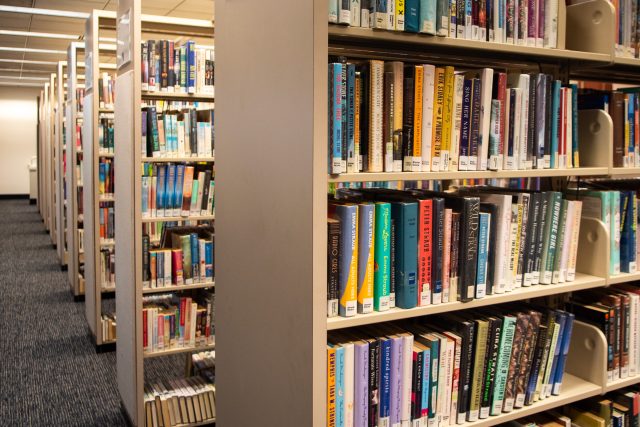[ad_1]
More than three dozen Ann Arbor community members gathered in the Ann Arbor District Library Downtown location Friday evening to listen to a performance of Mykola Horbal’s poetry and songs. Horbal, a Ukrainian poet and political activist, was imprisoned three times in the Gulag for speaking out against the Soviet regime. While in prison, he wrote “Details of an Hourglass: Poems from the Gulag,” later translated into English by Myrosia Stefaniuk, a writer and translator based in Michigan. At the event, Stefaniuk read excerpts of the English translation while Mykola Deychakiwsky, a bandura player, provided musical accompaniment.
The event began with an introduction from Irina Bondarenko, president of the Ann Arbor branch of the Ukrainian National Women’s League of America and University of Michigan School of Public Health statistician lead. Bondarenko spoke about the importance of the Ukrainian language in the country and said it continues to be widely suppressed by Russia.
“Language can influence, can injure, can heal,” Bondarenko said. “Today’s event celebrates the power of the word to set one free, even in Gulag, even in imprisonment. The Ukrainian language is like a fishbone in the throat of Russian colonial powers.”
The performance, organized in partnership with the local branch of the UNWLA, was dedicated to Assya Humesky, U-M Slavic Languages and Literatures professor emerita and founding member of the branch, who recently passed away. Svitlana Rogovyk, U-M Slavic Languages and Literatures professor, said Humesky was a staunch advocate for the importance of studying Ukrainian culture.
“Her widely used textbook, as many of you know, was published in 1980 and provided essential resources to students and scholars fostering a deeper understanding of the Ukrainian language,” Rogovyk said. “Her active involvement with the Ukrainian Academy of Arts and Sciences in the United States, where she served as vice president, was instrumental in advancing Ukrainian studies and fostering a communication of Ukrainian heritage across academic communities.”
The majority of the event consisted of oral performances of excerpts from “Details of an Hourglass.” The performances alternated between analysis provided by Stefaniuk and poetry recitation and music provided by Deychakiwsky. Stefaniuk said the poems served as a proclamation of truth for Horbal.
“For him, the word became a powerful weapon for breaking prison walls,” Stefaniuk said. “Ultimately, it is his redemption from isolation, alienation, darkness and despair amidst the barren, grizzled surroundings devoid of warmth, light (and) human touch.”
Stefaniuk explained the name of Horbal’s book, “Details of an Hourglass,” came from his claim that counting time was the essence of what he did in prison.
“The other fundamental element in Horbal’s work is time,” Stefaniuk said. “He chose the book’s title, “Details of an Hourglass,” because that is what you do in prison: You observe time. Every day in itself is identical, gray like those sand grains, no visual or audio stimulation from the outside; just the same thing, day after day, one grain after another.”
Throughout the event, organizers played renditions of songs Horbal wrote on the bandura, a Ukrainian string instrument. In an interview with The Michigan Daily, Deychakiwsky said it was an uplifting challenge for him to convey the meaning of Horbal’s poetry through music.
“The melodies were his, because he had been a music teacher before he was in prison,” Deychakiwsky said. “So it was also a joy of discovery for me to say, ‘Okay, here are these melodies. What harmonies do I use? How do I make an accompaniment that makes sense, that doesn’t cover up and hide the meaning of the word, because that was the most important thing.’”
In an interview with The Michigan Daily at the event, LSA junior Jake Foley said listening to the poems read aloud gave him a new perspective of past events in the history of Russia and Ukraine, especially that of the Gulag and the experiences of those imprisoned there.
“I was able to get more of a personal experience with it, with the music, the poems,” Foley said. “I felt it was more powerful than reading it out of a textbook.”
When reflecting upon her motivations to be involved in such an event, Stefaniuk said she wants to spread more awareness of the Ukrainian language and culture because both are currently being attacked in the Russia-Ukraine war.
“The brutality of the war that’s going on there, the atrocities that are going on in Ukraine, have been going on for centuries, and it almost seems like every time it gets worse,” Stefaniuk said. “That’s why I got into translations, because I thought it’s not enough for (just) Ukrainians to know about this. This has to go off into the world, especially now that the world sees what is going on.”
Daily Staff Reporter Michelle Liao can be reached at mrliao@umich.edu.
Related articles
[ad_2]
Source link











